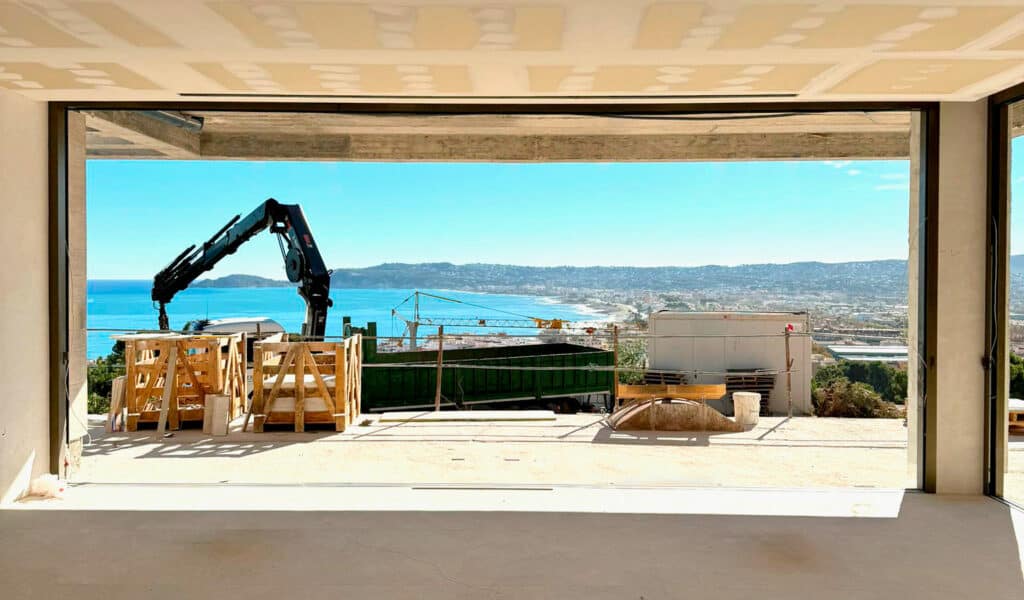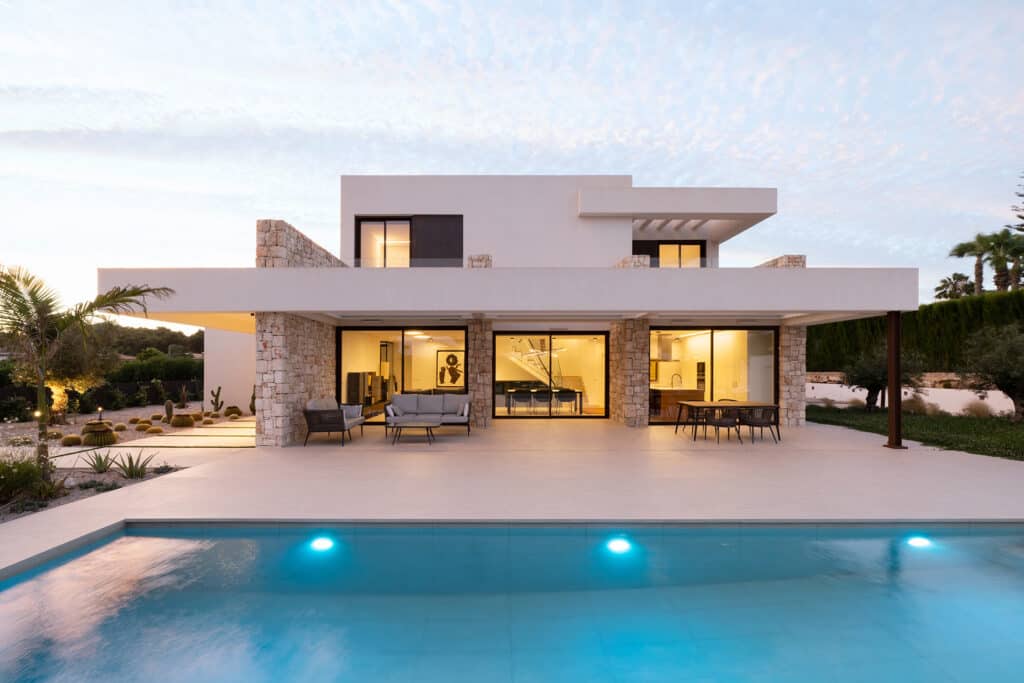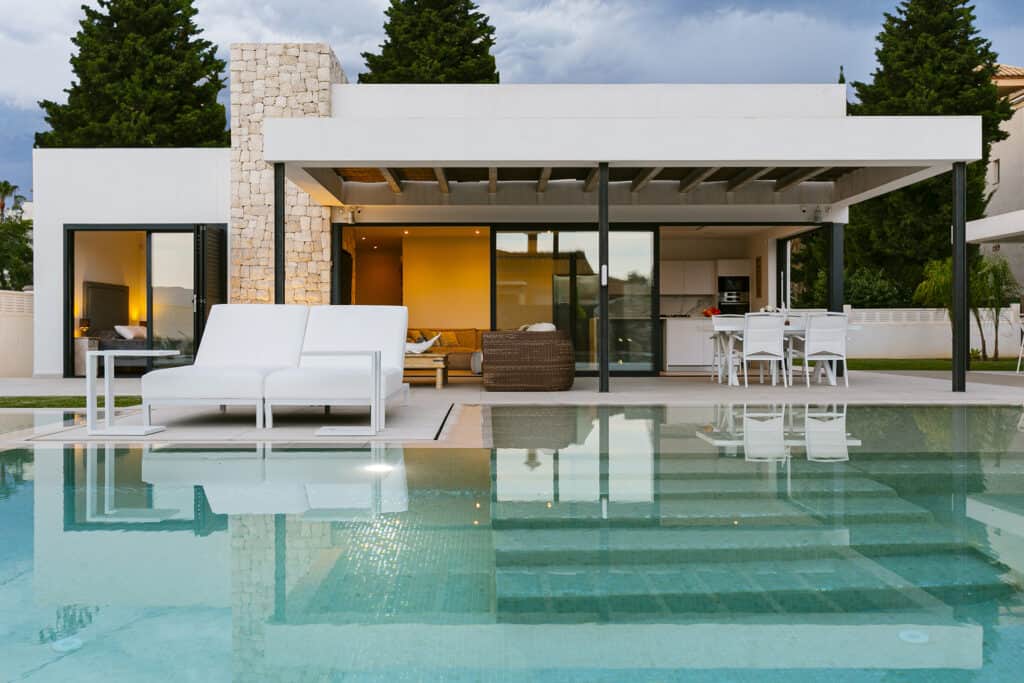Building a house in Spain requires planning and attention to detail. Before starting, it’s important to consider key aspects such as location, building regulations, and obtaining the necessary permits. You also need to have sufficient financial resources and select reliable professionals to carry out the work. During the construction process, constant monitoring is crucial, as well as keeping in mind the associated costs. Finally, a final inspection is carried out and the corresponding legal procedures are completed, taking into account applicable taxes.
Key Aspects Before Building a House in Spain
Ideal Plot and Location in Spain
Before starting the construction of a house in Spain, choosing a suitable plot is crucial. The ideal location will depend on various factors, such as personal preferences, accessibility, proximity to services, and solar orientation. It is advisable to look for land with good communication, close to schools, supermarkets, and public transport, and with a south orientation to take advantage of sunlight. In addition, the slope of the land should be considered to ensure it’s suitable for building a house.
Building Norms and Regulations in Spain
Before starting any construction project in Spain, it is essential to be informed about the current norms and regulations. Each municipality has its own urban planning and construction rules that must be complied with. Research and familiarize yourself with the specific regulations of the area where you will build the house. These regulations cover aspects such as maximum height, land occupation, permitted materials, requirements for thermal and acoustic insulation, among others. It is important to request and obtain all necessary licenses to ensure the legality of the project.
Development of an Architectural Project in Spain
Before starting the construction of a house in Spain, it’s crucial to develop a detailed architectural project that complies with all current building norms and regulations. This project will be the guide for construction and must be carried out by an architect specialized in self-promotion.
Hiring an Architect Specialized in Self-Promotion in Spain
To create a quality architectural project, it’s essential to have the services of an architect specialized in self-promotion in Spain. This professional has experience in residential projects and can adapt the house design to your specific needs and preferences. When selecting an architect, it’s important to ask for references, review their portfolio, and ensure they are licensed and registered with the College of Architects.
Compliance with Norms and Obtaining Licenses in Spain
The architectural project must comply with all the construction norms and regulations in Spain. These regulations vary according to location, so it’s necessary to research and familiarize yourself with local laws. In addition, to carry out the construction of the house, all necessary licenses must be obtained, such as the Major or Minor Work License and comply with the requirements established by the City Council and other regulatory entities.
The specialized architect will take care of drafting the technical project, which will include the architectural plans, technical reports, structural calculations, and other documents necessary to obtain the corresponding licenses. Compliance with norms and obtaining licenses are fundamental steps to ensure the legality and safety of the house construction in Spain.
Financing to Build a House in Spain
To carry out the construction project of a house in Spain, it’s fundamental to have the necessary financial resources. These resources will cover the different expenses related to the purchase of the land, the construction of the house, and other required professional services.
3.1. Necessary Financial Resources in Spain
Before embarking on the construction of a house in Spain, it’s important to evaluate the available financial resources. This involves considering the cost of the suitable plot, the fees of the architect and other professionals involved, the purchase of construction materials, necessary permits, and other additional expenses.
It’s advisable to make a detailed budget that covers all these aspects. This will allow you to have a clear idea of how much money is needed to carry out the construction project of the house in Spain.
3.2. Financing Options in Spain
Once the necessary financial resources are evaluated, it’s time to consider the different financing options available in Spain. Some of the common alternatives include:
– Mortgage loans: This option involves applying for a loan from a financial entity, where the house acts as collateral. It’s important to compare different options and conditions to find the best offer.
– Lines of credit: Lines of credit offer flexibility in payments and allow access to necessary funds during the construction process.
– Personal savings: Using personal savings to finance the construction of the house can be a viable option, especially if you have sufficient resources without needing to go into debt.
It’s important to analyze the conditions and requirements of each financing option, as well as evaluate the long-term payment capacity. Additionally, it’s advisable to seek financial advice to make an informed decision and properly manage the financial resources allocated to the construction of the house in Spain.
Selection of Professionals and Teams in Spain
In the process of building your house in Spain, it’s essential to have highly qualified professionals and teams. At this stage, careful selection of the architect, the builder, and other specialists involved in the project is required.
Architect, Builder, and Other Specialists in Spain
The first step is to hire an architect specialized in self-promotion, who has experience in building homes in Spain. It’s advisable to seek references and evaluate previous work to ensure you have a trusted professional who can meet expectations. The architect will be responsible for designing the house according to your needs and complying with all the building norms in force in Spain. He or she will also supervise the work and coordinate with all other professionals involved to ensure successful construction. It’s equally important to select a builder with demonstrated experience in home construction. This professional must have solid technical knowledge, suitable equipment, and a competent work team. As with the architect, it’s advisable to ask for references and visit previous works to assess the quality of their work. In addition to the architect and builder, you may need other specialists such as electricians, plumbers, carpenters, among others, depending on the needs of your project. Make sure to select qualified professionals with experience in the field of home construction.
Importance of Researching and Having Reliable Professionals in Spain
The proper selection of professionals and teams in the construction of your house in Spain is crucial to ensure the success of the project. Conducting thorough research, asking for references, and evaluating previous work will help you make informed decisions and have reliable professionals. Working with trustworthy professionals not only ensures quality and compliance with deadlines, but also provides peace of mind throughout the construction process. Effective communication, transparency in budgets, and the ability to solve problems effectively are key elements in selecting the right professionals. Remember that building a house in Spain is an important and long-lasting project, so it’s essential to have a team of competent and committed professionals. Do not skimp on research and selection of the best, as this will make a difference in the final result of your home.

Construction House in Spain Building House Villa Spain
Construction Process of a House in Spain
The construction process of a house in Spain requires rigorous monitoring and control of the work to guarantee a successful outcome. Below, the key aspects to carry out this process efficiently are detailed.
Monitoring and Control of the Work in Spain
During the construction of the house in Spain, it’s essential to carry out constant monitoring of the work. For this, it’s advisable to hire a work director who supervises and coordinates all aspects of the project. Their main function will be to ensure that established deadlines are met and that quality is maintained in the execution of tasks.
Additionally, the following aspects should be considered:
– Detailed Scheduling: It’s important to have a detailed work plan that indicates the sequence of tasks and the estimated deadlines for each one.
– Cost Control: A constant record and monitoring of expenses related to construction, such as materials and labor, should be kept to avoid deviations from the initial budget.
– Quality of Materials: Continuous supervision of the materials used is necessary, ensuring that they meet the established quality standards.
– Periodic Inspections: Regular inspections should be carried out during the work to review the progress of the tasks and verify that construction and safety standards are being met.
– Effective Communication: Maintaining constant and fluid communication with the professionals involved in the construction is key to resolve any problems or necessary adjustments in the process.
Associated Costs of Construction in Spain
The construction of a house in Spain entails various costs that must be taken into account in the budget. Some of the main costs associated with construction include:
– Architectural project: Hiring an architect to develop the house project involves an initial cost that can vary depending on the complexity of the design.
– Licenses and permits: It’s necessary to obtain all the corresponding licenses and permits to start the work, which implies an additional cost.
– Foundation and structure: Preparing the land and constructing the foundation and structure are fundamental processes that require a significant investment.
– Construction materials: The cost of the materials necessary to carry out the construction, such as bricks, cement, paint, among others, should be considered.
– Labor: The fees of the professionals involved, such as architects, builders, electricians, plumbers, must also be taken into account in the budget.
It’s essential to conduct a detailed study of all these costs and have an additional margin for unforeseen events that may arise during the construction process.
Final Inspection and Delivery of the House in Spain
Once the construction is completed, a final inspection is necessary to verify that the house meets all the requirements established in the building norms and regulations in Spain. This inspection is carried out to ensure safety, quality, and the correct functioning of all aspects of the house.
Verification of Compliance with Requirements in Spain
In this stage, an exhaustive review of each detail of the house is carried out to ensure that it has been built according to the approved architectural project and the required technical specifications. It is verified that the materials used comply with the established quality standards and that all facilities, both electrical and plumbing, are functioning properly.
Furthermore, it is checked that all fire safety and protection measures have been complied with, such as the installation of smoke detectors, fire extinguishers, and emergency exits. The correct thermal and acoustic insulation of the dwelling is also verified, as well as the proper arrangement of ventilation and lighting systems.
It is important to mention that the final inspection also includes a review of the outdoor spaces, such as gardens, terraces, or swimming pools, to ensure that they comply with the requirements and regulations applicable in Spain.
Taxes associated with construction in Spain
At the time of the delivery of the dwelling, it is necessary to take into account the taxes associated with construction in Spain. Among the most common taxes are the Value Added Tax (IVA), the Tax on Construction, Installations and Works (ICIO), and the Property Tax (IBI).
IVA is applied to the construction of new homes and is usually 10% or 21% depending on the province. On the other hand, ICIO is a municipal tax that taxes the realization of construction works and is usually about 4% of the construction budget. IBI is an annual tax on real estate property and varies according to the cadastral value of the dwelling.
It is essential to take these taxes into account and consult with a financial or accounting advisor to know and comply with all the corresponding tax obligations in Spain.




